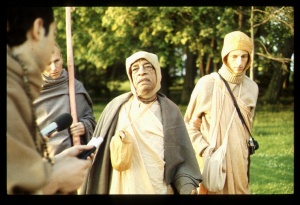SB 2.10.21: Difference between revisions
m (1 revision(s)) |
No edit summary |
||
| Line 1: | Line 1: | ||
{{info | {{info | ||
|speaker= | |speaker=Śukadeva Gosvāmī | ||
|listener=King | |listener=King Parīkṣit | ||
}} | }} | ||
[[Category:Srimad-Bhagavatam - Canto 02 Chapter 10]] | |||
[[Category:Bhagavatam Verses Spoken by Sukadeva Gosvami - Vanisource|021021]] | |||
<div style="float:left">'''[[Srimad-Bhagavatam]] - [[SB 2|Second Canto]] - [[SB 2.10: Bhagavatam Is the Answer to All Questions|Chapter 10: Bhagavatam Is the Answer to All Questions]]'''</div> | |||
<div style="float:right">[[File:Go-previous.png|link=SB 2.10.20]] '''[[SB 2.10.20]] - [[SB 2.10.22]]''' [[File:Go-next.png|link=SB 2.10.22]]</div> | |||
{{RandomImage}} | |||
==== TEXT 21 ==== | ==== TEXT 21 ==== | ||
<div | <div class="verse"> | ||
yadātmani nirālokam | :yadātmani nirālokam | ||
ātmānaṁ ca didṛkṣataḥ | :ātmānaṁ ca didṛkṣataḥ | ||
nirbhinne hy akṣiṇī tasya | :nirbhinne hy akṣiṇī tasya | ||
jyotiś cakṣur guṇa-grahaḥ | :jyotiś cakṣur guṇa-grahaḥ | ||
</div> | </div> | ||
| Line 16: | Line 22: | ||
==== SYNONYMS ==== | ==== SYNONYMS ==== | ||
<div | <div class="synonyms"> | ||
''yadā''—while; ''ātmani''—unto Himself; ''nirālokam''—without any light; ''ātmānam''—His own transcendental body; ''ca''—also other bodily forms; ''didṛkṣataḥ''—desired to look upon; ''nirbhinne''—due to being sprouted; ''hi''—for; ''akṣiṇī''—of the eyes; ''tasya''—of Him; ''jyotiḥ''—the sun; ''cakṣuḥ''—the eyes; ''guṇa-grahaḥ''—the power of seeing. | |||
</div> | </div> | ||
| Line 23: | Line 29: | ||
==== TRANSLATION ==== | ==== TRANSLATION ==== | ||
<div | <div class="translation"> | ||
Thus when everything existed in darkness, the Lord desired to see Himself and all that was created. Then the eyes, the illuminating god Sun, the power of vision and the object of sight all became manifested. | Thus when everything existed in darkness, the Lord desired to see Himself and all that was created. Then the eyes, the illuminating god Sun, the power of vision and the object of sight all became manifested. | ||
</div> | </div> | ||
| Line 30: | Line 36: | ||
==== PURPORT ==== | ==== PURPORT ==== | ||
<div | <div class="purport"> | ||
The universe is by nature dense darkness, and therefore the total creation is called tamas, or darkness. The night is the real feature of the universe, for then one cannot see anything, including oneself. The Lord, out of His causeless mercy, first desired to see Himself and all the creation as well, and thus the sun became manifested, the power of vision for all living entities became possible, and the objects of vision were also manifested. This means that the whole phenomenal world became visible after the creation of the sun. | The universe is by nature dense darkness, and therefore the total creation is called ''tamas'', or darkness. The night is the real feature of the universe, for then one cannot see anything, including oneself. The Lord, out of His causeless mercy, first desired to see Himself and all the creation as well, and thus the sun became manifested, the power of vision for all living entities became possible, and the objects of vision were also manifested. This means that the whole phenomenal world became visible after the creation of the sun. | ||
</div> | </div> | ||
__NOTOC__ | |||
<div style="float:right; clear:both;">[[File:Go-previous.png|link=SB 2.10.20]] '''[[SB 2.10.20]] - [[SB 2.10.22]]''' [[File:Go-next.png|link=SB 2.10.22]]</div> | |||
__NOTOC__ | |||
__NOEDITSECTION__ | |||
Revision as of 09:41, 24 May 2021

A.C. Bhaktivedanta Swami Prabhupada
TEXT 21
- yadātmani nirālokam
- ātmānaṁ ca didṛkṣataḥ
- nirbhinne hy akṣiṇī tasya
- jyotiś cakṣur guṇa-grahaḥ
SYNONYMS
yadā—while; ātmani—unto Himself; nirālokam—without any light; ātmānam—His own transcendental body; ca—also other bodily forms; didṛkṣataḥ—desired to look upon; nirbhinne—due to being sprouted; hi—for; akṣiṇī—of the eyes; tasya—of Him; jyotiḥ—the sun; cakṣuḥ—the eyes; guṇa-grahaḥ—the power of seeing.
TRANSLATION
Thus when everything existed in darkness, the Lord desired to see Himself and all that was created. Then the eyes, the illuminating god Sun, the power of vision and the object of sight all became manifested.
PURPORT
The universe is by nature dense darkness, and therefore the total creation is called tamas, or darkness. The night is the real feature of the universe, for then one cannot see anything, including oneself. The Lord, out of His causeless mercy, first desired to see Himself and all the creation as well, and thus the sun became manifested, the power of vision for all living entities became possible, and the objects of vision were also manifested. This means that the whole phenomenal world became visible after the creation of the sun.